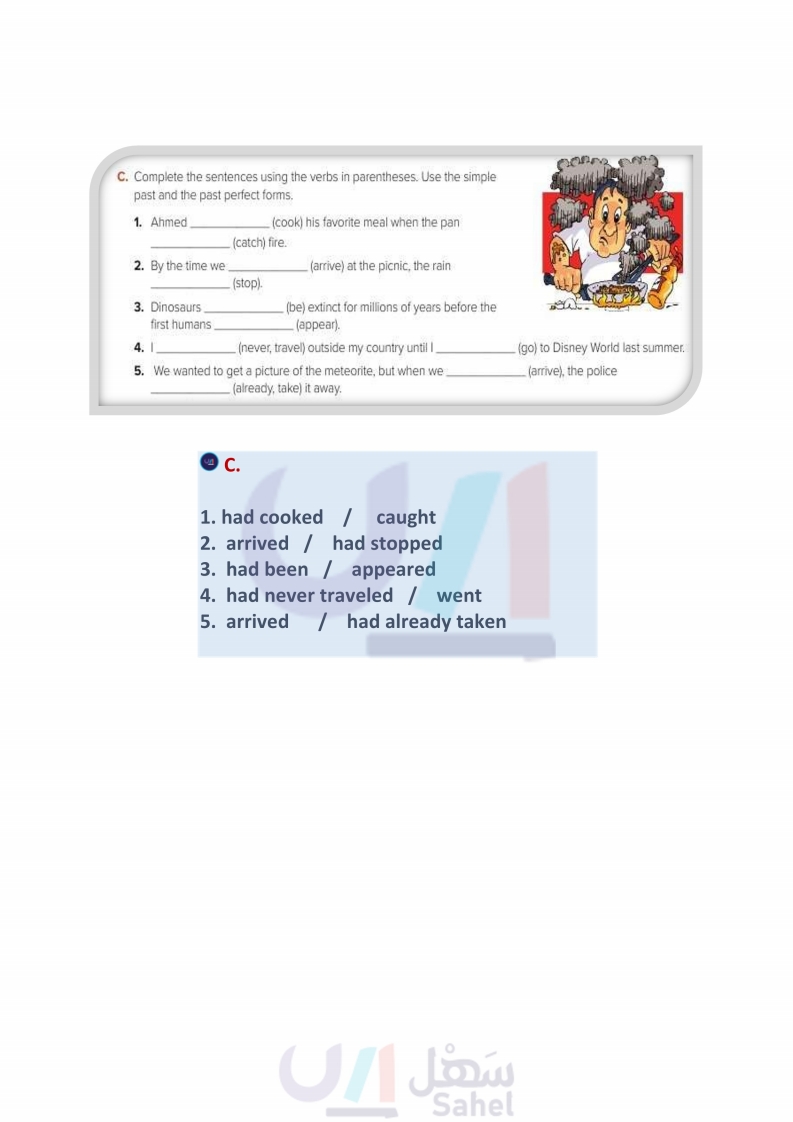Form Meaning and Function - Mega goal 3 - ثالث ثانوي
Part 1
Unit1: Two Is Better Than One
Unit2: influential people
Unit3: What Will They Think of Next
Unit4: The World of TV
Unit5: Do You Really Need It
Unit6: The Gender Divide
Part 2
unit7: Everyone Makes Mistakes
unit8: Against the Odds
unit9: Beauty Is Only Skin Deep
unit10: They Said, We Said
unit11: Express Yourself
unit12: Lost and Found
Part 1
Part 2
O 8 Against the Odds 11 Form, Meaning and Function Past Progressive رابط الدرس الرقمي www.ien.edu.sa Use the past progressive (be + present participle) to describe a long action that is interrupted by a short action. As Figlock was walking down a Chicago Street, a baby fell from a fourth-story window. A year later, while he was passing by that same building, the same baby fell out of the same window and landed on Mr. Figlock. Use the past progressive when we describe what was happening at a specific time in the past. Q: What were you doing at three o'clock today? A: I was driving home from work. Use the past progressive when we talk about a temporary state or action. Q: Have you always lived in Riyadh? Q: What were you doing in Dubai? A: No. A few years ago, I was living in Dubai. A: I was studying for my degree. Use the past progressive with always to describe a repeated or annoying action. My old car was always breaking down so I bought a new one. Use the past progressive to describe two actions that were happening at the same time. On June 6, 1980, Edwin Robinson was out walking and looking for his pet chicken during a thunderstorm when he was struck by lightning. Was/Were Going To and Was/Were About To Use was/were going to/about to + base form to refer to actions that were intended but probably didn't happen. I was going to study Engineering, but my father advised me otherwise. They were just about to leave when the phone rang. A. Complete the news report using the verbs in parentheses. Use the passive and active simple past, the past progressive tense and was/were about to. The last thing 17-year-old Ricardo Gordon remembers a storm to get inside. Next thing he (2. be about to) come, and he (4. know), he (6. happen). in a hospital bed. Here is what Ricardo game when lightning. ears (7. listen) to the live broadcast of the football (1. be) that (3. rush) (5. lie) (8. hit) him. As a result, his hair and (9. burn), and he over his body. The wounds on his body smartphone, from his ears down to his hip, where he the device. The electric current his headphones. Ricardo is lucky to be alive! (10. have) dark spots all (11. follow) the wire of his (12. carry) (13. travel) from his smartphone to B. Work with a partner. Look at the newspaper headlines and imagine the story. Tell the story. British Burglar Says "Sorry" with Flowers وزارة التعليم Ministry 20ation 2024-1446 MG_03_COMBO_TEXT_2024.indb 120 Paper Boy Steals Truck to Speed Up Deliveries 50 Criminals with Big Plans, Small Car 30/4/24 3:05 AM

O Past Perfect Tense Use the past perfect tense (had + past participle) to indicate an action that happened before another action in the past When Edwin Robinson was struck by lightning he had been blind and deaf for almost 10 years. Past Perfect Progressive and Past Simple Tense We use the past perfect progressive when the activity was in progress at the time another activity or event happened in the past. King Umberto of Italy had been climbing into his carriage when he was assassinated. C. Complete the sentences using the verbs in parentheses. Use the simple past and the past perfect forms. 1. Ahmed (cook) his favorite meal when the pan (catch) fire. 2. By the time we (arrive) at the picnic, the rain (stop). 3. Dinosaurs first humans 4. | (be) extinct for millions of years before the (appear). (never, travel) outside my country until I 5. We wanted to get a picture of the meteorite, but when we (already, take) it away. (go) to Disney World last summer. (arrive), the police D. Read the article from a small-village newspaper about a local amateur car repairer. Complete the article with the correct form of the verbs. For some answers, both the simple past and the past perfect forms are possible. Hobbyist Engine Repairer Forgets Important Detail HILLCREST, Texas-John Wilkinson, an amateur car mechanic, engine after it started to make strange noises. (1. attempt) to fix his car's Wilkinson (2. spend) weeks planning every detail of the repair. He all the extra tools he required, and (4. take) the engine off his car. Wilkinson (3. buy) (5. feel) confident that he (6. plan) all the delicate work completely and correctly. The repair itself (7. go) off without a hitch. The problems began when Wilkinson (8. try) to test the engine after three days of work in his garage. Wilkinson وزارة التعليم Ministry of Education 2024-1446 (11. try) to (9. decide) to run the engine after he put everything back in place. He (10. leave) the engine running for a long time to test it. He then drive the car to check that all was working perfectly but the engine suddenly stopped. Wilkinson was very worried that something had gone wrong with the engine, but he then he (13. make) an incredibly foolish mistake. He repairing and checking the engine, that he test drive! (12. discover) that (14. think) so much about (15. forget) to fill the gas tank before starting the MG_03_COMBO_TEXT_2024.indb 121 121 30/4/24 3:05 AM




















